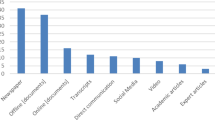Abstract
The emerging interdisciplinary work in language politics and language policy and planning studies demonstrates a rising interest among researchers in the interface between sociolinguistics, political science and philosophy. Much of the resulting cross-disciplinary work, however, tends to focus on the subject matters (politics, language) themselves rather than explore the broader issues that transpire from working in the interface between distinct fields of academic inquiry. Reflecting on the meaning of interdisciplinary work in LPP, I examine the interface and internal fences between sociolinguistics and political philosophy as fields of inquiry. I then move on to consider the way(s) in which “thinking linguistically” and “thinking politically” may be advantageously combined in the fundamentally interdisciplinary terrain of normative language policy.
Similar content being viewed by others
References
Archibugi, D. (2005). The languages of democracy: Vernacular or Esperanto? A comparison between the multiculturalist and cosmopolitan perspectives. Political Studies, 53(3), 537–555.
Bastardas-Boada, A. (2013). Language policy and planning as an interdisciplinary field: Towards a complexity approach”. Current Issues in Language Planning, 14(3–04), 363–381.
Carens, J. (2000). Culture, citizenship, and community: A contextual exploration of justice as evenhandedness. Oxford: Oxford University Press.
De Schutter, H. (2007). Language policy and political philosophy: On the emerging linguistic justice debate. Language problems and language planning, 31(1), 1–23.
Elllis, N. C., & Larsen-Freeman, D. (2009). Language as a complex adaptive system. London: Wiley Blackwell.
Freeden, M. (2013). The political theory of political thinking: The anatomy of a practice. Oxford: Oxford University Press.
Frodeham, R., Klein, J. T., & Mitcham, C. (2010). The Oxford handbook of interdisciplinarity. Oxford: Oxford University Press.
Hadorn, G. H., Hoffman-Riem, H., Biber-Klemm, S., Grossenbacher-Mansuy, W., Joye, D., Phol, C., et al. (Eds.) (2008). Handbook of interdisciplinary research. Springer and the Swiss Academy of Arts and Sciences.
Ives, P. (2010). Cosmopolitanism and global English: Language politics in globalisation debates. Political Studies, 58(3), 516–535.
Klein, J. T. (1991). Interdisciplinarity: History, theory, practice. Detroit: Wayne State University Press.
Klein, J. T. (1996). Crossing boundaries: Knowledge, disciplinarities, and interdisciplinarities. Charlottesville: University of Virginia Press.
Klein, J. T. (2004). Interdisciplinarity and complexity: An evolving relationship. Emergence: Complexity & Organization, 6(1–2), 2–10.
Klein, J. T. (2005). Humanities, culture, and interdisciplinarity: The changing American academy. Albany: New York State University.
Kymlicka, W., & Patten, A. (2003). Introduction: Language rights and political theory: Contexts, issues and approaches. In W. Kymlicka & A. Patten (Eds.), Language rights and political theory (pp. 1–51). Oxford: Oxford University Press.
Massip-Bonnet, A., & Bastardas-Boada, A. (Eds.). (2013). Complexity perspectives on language, communication and society. London: Springer.
May, S. (2003). Misconceiving minority language rights: Implications for liberal political theory. In W. Kymlicka & A. Patten (Eds.), Language rights and political theory (pp. 13–15). Oxford: Oxford University Press.
Miller, D. (2001). Principles of social justice. Cambridge: Harvard University Press.
Moran, J. (2002). Interdisciplinarity. London: Routledge.
Okin, S. M., Cohen, J., Howard, M., & Nussmabum, M. C. (1999). Is multiculturalism bad for women?. New Jersey: Princeton University Press.
Peled, Y. (2011). Language, rights, and the language and language rights: The need for a new conceptual framework in the political theory of language policy. Journal of Language and Politics, 10(3), 436–456.
Peled, Y. (2012). Marching forward into the past: Monolingual multilingualism in contemporary political theory. In M. Hüning & U. Vogl (Eds.), Standard languages and multilingualism in European history (pp. 71–96). Amsterdam: John Benjamins.
Réaume, D., & Pinto, M. (2012). Philosophy of language policy. In B. Spolsky (Ed.), The Cambridge handbook of language policy (pp. 37–58). Cambridge: Cambridge University Press.
Repko, A. F. (2011). Interdisciplinary research: Process and theory. London: Sage.
Ricento, T. (2000). Historical and theoretical perspectives in language policy and planning. Journal of sociolinguistics, 4(2), 196–213.
Ricento, T. (2005a). Theoretical perspectives in language policy: An overview. In T. Ricento (Ed.), An introduction to language policy: Theory and methods (pp. 3–10). Malden, MA: Blackwell.
Ricento, T. (2005b). Language policy: Theory and practice—An introduction. In T. Ricento (Ed.), An introduction to language policy: Theory and methods (pp. 10–24). Malden, MA: Blackwell.
Schmidt, R. (2005). Political theory and language policy research. In T. Ricento (Ed.), An introduction to language policy: Theory and methods (pp. 95–110). Malden, MA: Blackwell.
Shapiro, I. (forthcoming). Justice against domination. Cambridge: Harvard University Press.
Spolsky, B. (2004). Language policy. Cambridge: Cambridge University Press.
Spolsky, B. (2009). Language management. Cambridge: Cambridge University Press.
Spolsky, B. (2010). Ferguson and Fishman: Sociolinguistics and the sociology of language. In R. Wodak, B. Johnstone, & P. E. Kerswill (Eds.), The SAGE handbook of sociolinguistics (pp. 3–15). London: Sage.
Walzer, M. (1984). Spheres of justice: A defence of pluralism and equality. New York: Basic Books.
Walzer, M., & Miller, D. (1995). Pluralism, justice and equality. Oxford: Oxford University Press.
Wee, L. (2011). Language without rights. Oxford: Oxford University Press.
Weingart, P. (2010). A short history of knowledge formations. In R. Frodeham, J. T. Klein, & C. Mitcham (Eds.), The Oxford handbook of interdisciplinarity (pp. 3–14). Oxford: Oxford University Press.
Author information
Authors and Affiliations
Corresponding author
Rights and permissions
About this article
Cite this article
Peled, Y. Normative language policy: interface and interfences. Lang Policy 13, 301–315 (2014). https://doi.org/10.1007/s10993-014-9325-z
Received:
Accepted:
Published:
Issue Date:
DOI: https://doi.org/10.1007/s10993-014-9325-z




